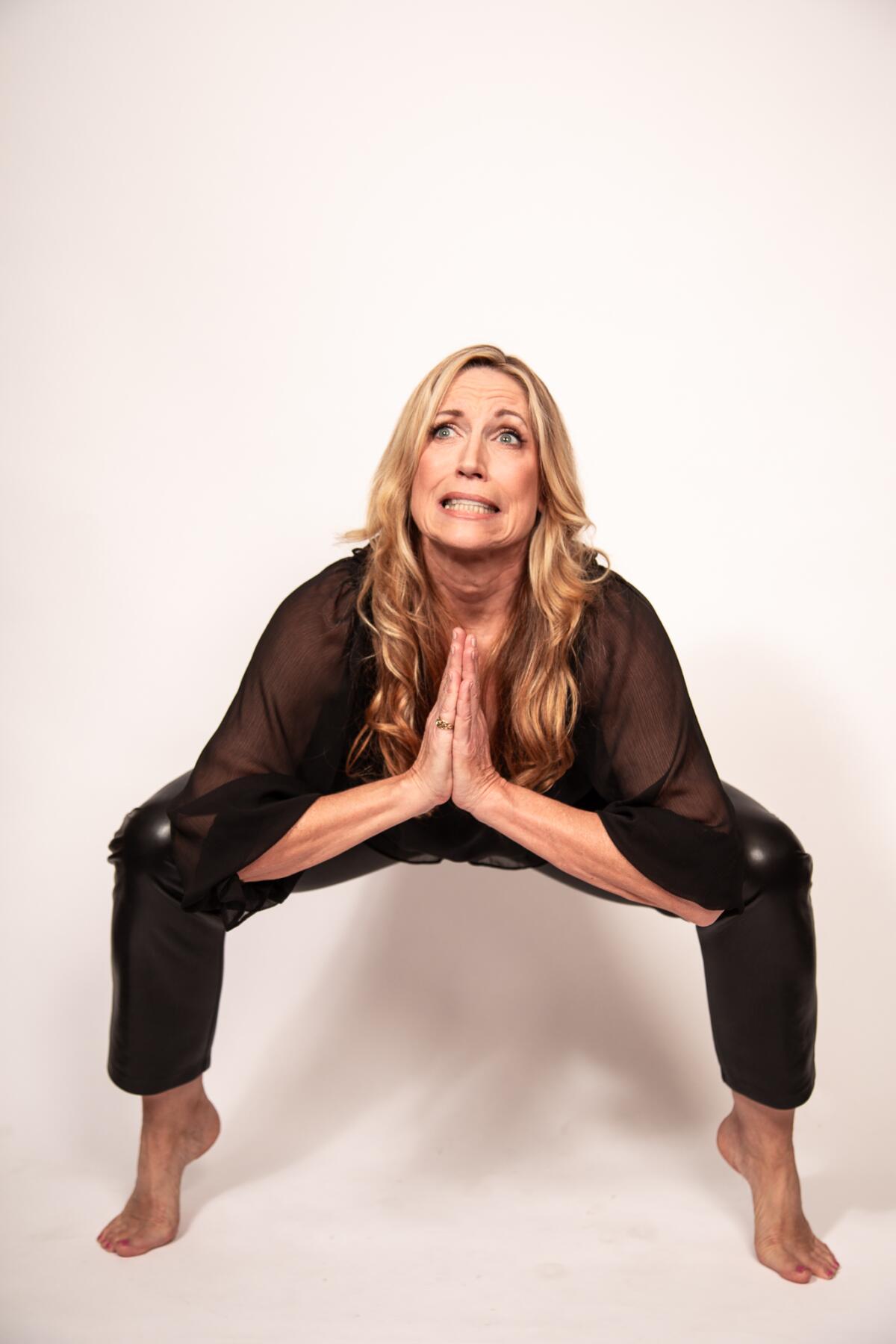How Laurie Kilmartin’s ‘Cis Woke Grief Slut’ special continues fighting for comedy equality

- Share via
“I want to date guys my age,” Laurie Kilmartin joked onstage at Flappers Comedy Club in early January. “I’m feeling it out on the apps, and divorced men in their 50s are not well. My theory is Gen X men are the last generation to play high-school sports without concussion protocols. They’re just out there, these horny, brain-damaged, shaken babies just DMing in all caps, ‘DO YOU KNOW JOE ROGAN?’”
Kilmartin and Jackie Kashian’s “Comics of the Week” Burbank monthly is a live spinoff of “The Jackie and Laurie Show” podcast, on which the pair address the inequality, misogyny, harassment, and missed opportunities that come with being a female comic. A recurring “Comic of the Week” segment highlights funny women listeners should follow. Contrasting most club shows, the Flappers lineup included Mary Lynn Rajskub, Carmen Morales, Jasmine Ellis, and “token male” Joey Bragg.
Ending with a story of receiving a $100 JetBlue voucher after filming the guy next to her masturbating, Kilmartin felt taken aback by a younger female comic calling the incident sexual assault. “Listen, I can’t get worked up over an unexposed penis,” she sighed. “I can only classify something a sexual assault if I report it to the police and they don’t believe me.”
On new special “Cis Woke Grief Slut,” out Jan. 30 on VOD platforms, Kilmartin continues addressing tough topics from the vantage of someone who’s seen, done and survived everything the industry can throw at her. An Emmy-nominated and WGA-winning writer for “Conan” and bestselling author of “S— Mom: The Parenting Guide for the Rest of Us,” Kilmartin has become one of the most fearless, respected performer-writers in the L.A. stand-up scene over the last three decades.
Kilmartin grew up in Walnut Creek, outside San Francisco. An avid swimmer, at 12 she joined the Amateur Athletic Union. By 18, in the lead-up to the 1984 Summer Olympics in Los Angeles, she’d been sexually abused by her coach. Andy King was sentenced to 40 years in prison for 17 counts of child molestation in 2009.

Post-traumatic stress disorder and eating disorders affected her time at UCLA before Kilmartin dropped out and lived back home. Between cleaning houses and telemarketing, she started watching local stand-up for laughs. She wasn’t impressed. Following her 1987 first time onstage at Fubar’s Comedy Club, she opted for a class at the Holy City Zoo. She quickly applied her same swimming work ethic to stand-up, getting onstage every night across the Bay Area.
“I didn’t know if I could be great, but I could be okay,” Kilmartin recalls. “And that was finally a light; a door opening that wasn’t a dark, depressed place.”
Not that progress was easy. “This is a generalization, but men get into stand-up to get laid, and women get into stand-up to be heard,” she says. “So the reasons we’re at these comedy clubs are very, very different.”
Particularly on the road, “I did not hang out, and that really hurts your career as a comic. I didn’t feel safe. I would do my set and leave. If you connect with the bookers and hang out they like you more, then they bring you back more. So making sure you’re safe will also slow down your career.”
Kilmartin moved to NYC in 1998, having lived with her parents until age 32. Her first TV job was Comedy Central’s “Tough Crowd with Colin Quinn.” She was the only woman in the writers’ room.
“Representing a gender doesn’t feel like you have the same freedom to pitch as many bad ideas as the guys do,” she notes. “They’re only representing themselves, versus you seem to be representing a lot of other people.”
Following stints with “The Late Late Show with Craig Ferguson” and “The Bonnie Hunt Show,” Kilmartin returned to California as staff writer for the full TBS run of “Conan.” She was again the lone woman before Jessie Gaskell and Leah Krinsky later came aboard. By the series’ 2021 completion, she’d finally noticed more diversity in writers’ rooms across L.A.
“It seems like everyone’s agreed that it’s a great idea to get more perspectives,” Kilmartin says today. “We get to say, ‘Hey, you might not realize it, but that joke might play kind of badly to women. Let’s maybe tweak it?’”
Subverting more mainstream appearances on everything from “Last Comic Standing” to Kimmel, Corden and Oprah, Kilmartin’s 2016 hour special “45 Jokes About My Dead Dad” discussed cancer, hospice care and grief. The cover image of 2018 book “Dead People Suck: A Guide for Survivors of the Newly Departed” featured her taking a selfie atop a coffin. In the same vein, she opens “CWGS” cautioning, “I hope you like dark comedy.”
Kilmartin shares her mixed emotions on suffering a miscarriage in her 40s and uplifts trans women as “fresh recruits in the war against patriarchy.” Having gone viral during the pandemic for live-tweeting jokes about her mother’s losing battle to COVID, Kilmartin deadpans, “She was a Trump supporter. So the coroner ruled her death a suicide.”

There was the more recent time she went viral too, for an abortion joke during a MSNBC Mother’s Day panel discussion on Roe vs. Wade. Sean Hannity and Lara Trump took offense on Fox News, and Kilmartin experienced a few intense days of hostile emails and social media messages. She was called misogynistic slurs, told she deserved to die, doxxed, and sent pictures of her house.
“It felt like a swarm of bees directed at me for 72 hours, and then they got directed somewhere else,” she shrugs.
When “The Jackie and Laurie Show” began in 2015, Kilmartin never envisioned it lasting. For better and worse, she says, “There’s always some new scandal and weirdness. I feel like for women, it’s good to hear other women talk about their experience in the same shorthand where men listening think, ‘That’s only for female comics!’ Well that’s how your podcast feels to me. You’re skipping our experience, so we’re going to skip yours.”
Both know countless women who’ve faded from the industry. “We’re competitive in a good way, and the podcast makes both of us work harder,” Kilmartin says of Kashian. “It’s nice to have someone who started at the same time and knows the Midwest version of the West Coast booker who paid you in cash with a gun on the table.”
A never-married single mom, Kilmartin says her 17-year-old Hispanic son has given her much-needed empathy, something lacking before motherhood. (“The whole capacity to love and that kind of stuff was sorely missing. He made me a better person.”)
As he prepares for college, Kilmartin continues shaping pitches and booking as many road dates as possible. With Kashian and others, she’s also spearheaded a group chat originally designed to offer bookers another woman to fill in should one need to cancel spots. As the list grew, its purpose evolved.
“Now we use it to text things that we shouldn’t.” Such as? “Gossip about things in the business we’re appalled about, but it wouldn’t be wise to complain about publicly for the sake of our careers.”
Today members of all ages live across the country. Though she’s proud of the community, Kilmartin admits she may go overboard in ensuring each one remains informed and safe.
“I do feel like they’re putting me on mute,” she laughs. “I keep forwarding tweets and articles and no one responds. I don’t know; maybe I ‘should’ be muted.”
More to Read
The biggest entertainment stories
Get our big stories about Hollywood, film, television, music, arts, culture and more right in your inbox as soon as they publish.
You may occasionally receive promotional content from the Los Angeles Times.











